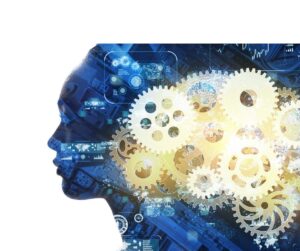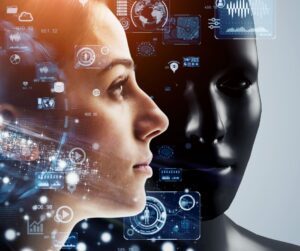Laureate of the 2018 Next Einstein Forum, and professor of bioinformatics and artificial intelligence at the University of Quebec, Montreal, Abdoulaye Baniré Diallo is a foremost expert on this emerging technology which generated both considerable interest and concern in recent months. He deciphers AI around three questions. He explains this emerging technology, the opportunities it opens up and the challenges we face in using it wisely, effectively and responsibly. Abdoulaye Baniré Diallo also recently chaired the Policy Support Facility Expert Panel tasked with helping Guinea draw up a national research and innovation policy.
Put simply, what is artificial intelligence? What does this technology represent and what is it used for?
Artificial intelligence (AI) is the use of computer science and engineering techniques to give instructions to computers so that they can mimic human intelligence in a number of ways – seeing, hearing, speaking, reading, reasoning, etc. – and automate certain activities. For example, AI enables a computer or computer system to take images from a camera in order to detect views, such as the objects inside these images. Or AI can extract useful information from sound. Algorithms can be trained to create and simulate environments, such as painting or drawing. But where the paradigm is changing a lot is that in recent years, in the field of artificial intelligence, there has been progress in a particular sector called machine learning, which enables machines to be trained to learn by themselves. Not only can machines carry out a series of precise instructions, they can also move into a dimension that is similar to that of humans. At school, children are often taught to solve exercises by providing them with data and approaches. By being confronted with the same exercises and solutions, they learn to solve these exercises. In the same way here, algorithms enable computers to learn from data, so that they can answer specific questions.

Could you tell us what opportunities artificial intelligence offers to the countries of Africa, the Caribbean and the Pacific, and if possible give us some concrete examples?
One of the strengths of artificial intelligence is that it is a combination of computer science, mathematics and engineering, mainly software engineering. And these three disciplines are not expensive from the point of view of learning and mastery, but also from the point of view of carrying out operations. Of course, there is a need for massive infrastructures for high-performance computing. But beyond that, simple or average applications that use artificial intelligence can be created quickly by young people who have learned to code and write algorithms on a tablet or a computer that doesn’t cost $500. So this opens up huge opportunities in the ACP countries.
These young people can address concrete problems facing their societies. For example, massive surveillance of insects that affect crops. It is possible to write algorithms that would make it possible to use small drones or simply mobile phones and photos to detect insects on the move. So young people could design these algorithms at low cost, deploy them and bring a concrete solution to their environment. The same applies to healthcare. Solutions could emerge to connect networks and provide first aid. Or to promote mutual aid and communication, improve transport and manage car-sharing systems much more efficiently. All these everyday problems can lead to innovation, in the form of algorithms and IT solutions based on artificial intelligence. And most of these can be designed at low cost.

And what are the main challenges to address in order to use AI successfully and safely?
One of the major challenges we face is the responsible use of these technologies. Like any new technology, it can be used for good or ill. And as these are computer systems that are capable of rapidly reaching populations on a massive scale, the impact can be very rapid and dramatic. I have in mind, for example, the dissemination of false information or doctored photos. We recently saw an image of the Pope wearing a down jacket on social networks. Informed people will understand that these are fake images. But that won’t necessarily be the case for people in our villages and in the most disadvantaged regions. We therefore need to move quickly towards appropriate legislation and regulations to protect companies from the abuses of AI-based technologies, but also to protect people’s identity, privacy and intellectual property.
The second challenge is training. We have a pool of young people who need to be trained as quickly as possible, with a solid grounding in mathematics and computer science. To achieve this, we need to give young people very rapid access to computer systems during their schooling, whether in primary school, secondary school or higher education, in order to create the necessary emulation and enable them to evolve in a digital environment.
With the penetration of computer systems, we also need to make sure that we don’t create ghettos in terms of services, with applications that would prevent a whole section of society, for example the elderly or people who don’t have access to a computer, from benefiting from certain services. So we need to ensure that this is the case. The issue of data collection is also very important, because AI-based systems are trained on data. If the data collected is biased, it is not representative and it may in fact lead to a denial of service for a group of individuals.
Let me give you an example that I personally experienced. I asked to take out life insurance.I travel a lot in Africa, in regions where we have very little data to assess risk.As a result, I was told that I couldn’t be insured. These kinds of problems are likely to have a massive impact on regions where very little data is collected, and therefore very little modelling is possible.And that risks creating new inequalities.
Finally, the last challenge to address is the training and digital culture of our leaders, so that they are aware of all the issues linked to artificial intelligence, to take the necessary decisions, particularly in terms of legislation, training and infrastructure.

